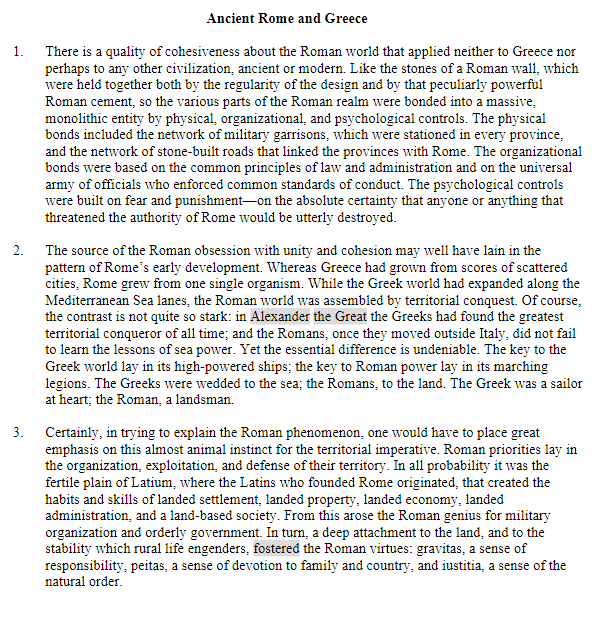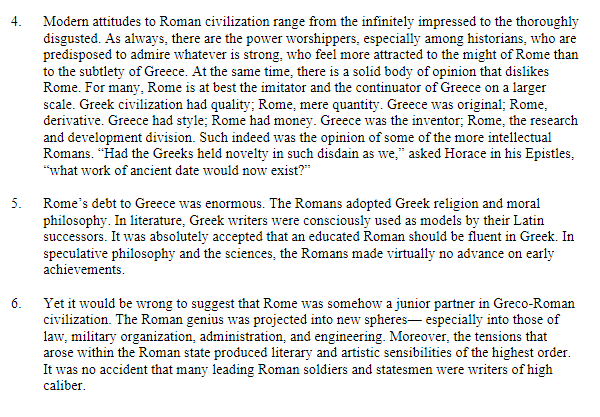托福分数测试HOT
托福课程优惠HOT
托福正价课试听0元
新托福机考练习NEW
0元讲座HOT
新版托福入门课程HOT
托福入门导学NEW
4000人报
托福机经
PDF版
TPO练习
官方授权
资料下载
826套
专业测评
40118人已测
高分经验
1193帖

扫码免费领资料
托福全科备考资料
免费水平测试及规划

扫码关注掌握一手留学资讯
回复XDF免费水平测试
新东方在线托福整理了托福备考书籍推荐(托福OG|托福绿宝书|托福官方指南等)、托福备考资料等,今天带来的是托福阅读模考试题和答案解析第一篇,希望大家能从书籍和资料中有所收获,在托福考试中取得好成绩!
ets发布的托福阅读模考完整版试题和答案解析,同学们可以扫码添加Una助教,即可免费领取!



Ancient Rome and Greece
1. There is a quality of cohesiveness about the Roman world that applied neither to Greece nor perhaps to any other civilization, ancient or modern. Like the stones of a Roman wall, which were held together both by the regularity of the design and by that peculiarly powerful Roman cement, so the various parts of the Roman realm were bonded into a massive, monolithic entity by physical, organizational, and psychological controls. The physical bonds included the network of military garrisons, which were stationed in every province, and the network of stone-built roads that linked the provinces with Rome. The organizational bonds were based on the common principles of law and administration and on the universal army of officials who enforced common standards of conduct. The psychological controls were built on fear and punishment—on the absolute certainty that anyone or anything that threatened the authority of Rome would be utterly destroyed.
2. The source of the Roman obsession with unity and cohesion may well have lain in the pattern of Rome’s early development. Whereas Greece had grown from scores of scattered cities, Rome grew from one single organism. While the Greek world had expanded along the Mediterranean Sea lanes, the Roman world was assembled by territorial conquest. Of course, the contrast is not quite so stark: in Alexander the Great the Greeks had found the greatest territorial conqueror of all time; and the Romans, once they moved outside Italy, did not fail to learn the lessons of sea power. Yet the essential difference is undeniable. The key to the Greek world lay in its high-powered ships; the key to Roman power lay in its marching legions. The Greeks were wedded to the sea; the Romans, to the land. The Greek was a sailor at heart; the Roman, a landsman.
3. Certainly, in trying to explain the Roman phenomenon, one would have to place great emphasis on this almost animal instinct for the territorial imperative. Roman priorities lay in the organization, exploitation, and defense of their territory. In all probability it was the fertile plain of Latium, where the Latins who founded Rome originated, that created the habits and skills of landed settlement, landed property, landed economy, landed administration, and a land-based society. From this arose the Roman genius for military organization and orderly government. In turn, a deep attachment to the land, and to the stability which rural life engenders, fostered the Roman virtues: gravitas, a sense of responsibility, peitas, a sense of devotion to family and country, and iustitia, a sense of the natural order.
4. Modern attitudes to Roman civilization range from the infinitely impressed to the thoroughly disgusted. As always, there are the power worshippers, especially among historians, who are predisposed to admire whatever is strong, who feel more attracted to the might of Rome than to the subtlety of Greece. At the same time, there is a solid body of opinion that dislikes Rome. For many, Rome is at best the imitator and the continuator of Greece on a larger scale. Greek civilization had quality; Rome, mere quantity. Greece was original; Rome, derivative. Greece had style; Rome had money. Greece was the inventor; Rome, the research and development division. Such indeed was the opinion of some of the more intellectual Romans. “Had the Greeks held novelty in such disdain as we,” asked Horace in his Epistles, “what work of ancient date would now exist?”
5. Rome’s debt to Greece was enormous. The Romans adopted Greek religion and moral philosophy. In literature, Greek writers were consciously used as models by their Latin successors. It was absolutely accepted that an educated Roman should be fluent in Greek. In speculative philosophy and the sciences, the Romans made virtually no advance on early achievements.
6. Yet it would be wrong to suggest that Rome was somehow a junior partner in Greco-Roman civilization. The Roman genius was projected into new spheres— especially into those of law, military organization, administration, and engineering. Moreover, the tensions that arose within the Roman state produced literary and artistic sensibilities of the highest order. It was no accident that many leading Roman soldiers and statesmen were writers of high caliber.
Directions: Now answer the questions.
1. According to paragraph 1, all of the following are controls that held together the Roman world EXCEPT
A. administrative and legal systems
B. the presence of the military
C. a common language
D. transportation networks
2. According to paragraph 2, which of the following was NOT characteristic of Rome’s early
development?
A. Expansion by sea invasion
B. Territorial expansion
C. Expansion from one original settlement
D. Expansion through invading armies
3. Why does the author mention “Alexander the Great” in the passage?
A. To acknowledge that Greek civilization also expanded by land conquest
B. To compare Greek leaders to Roman leaders
C. To give an example of a Greek leader whom Romans studied
D. To indicate the superior organization of the Greek military
4. The word “fostered” in the passage is closest in meaning to
A. accepted
B. combined
C. introduced
D. encouraged
5. Paragraph 3 suggests which of the following about the people of Latium?
A. Their economy was based on trade relations with other settlements.
B. They held different values than the people of Rome.
C. Agriculture played a significant role in their society.
D. They possessed unusual knowledge of animal instincts.
6. Paragraph 4 indicates that some historians admire Roman civilization because of
A. the diversity of cultures within Roman society
B. its strength
C. its innovative nature
D. the large body of literature that it developed
7. According to paragraph 4, intellectual Romans such as Horace held which of the following opinions about their civilization?
A. Ancient works of Greece held little value in the Roman world.
B. The Greek civilization had been surpassed by the Romans.
C. Roman civilization produced little that was original or memorable.
D. Romans valued certain types of innovations that had been ignored by ancient Greeks.
8. Which of the following statements about leading Roman soldiers and statesmen is supported by paragraphs 5 and 6?
A. They could read and write the Greek language.
B. They frequently wrote poetry and plays.
C. They focused their writing on military matters.
D. They wrote according to the philosophical laws of the Greeks.
9. In the paragraph below, there is a missing sentence. Look at the paragraph and indicate (A,B, C and D) where the following sentence could be added to the passage.
They esteem symbols of Roman power, such as the massive Colosseum.
Where would the sentence best fit?
Modern attitudes to Roman civilization range from the infinitely impressed to the thoroughly disgusted. (A) As always, there are the power worshippers, especially among historians, who are predisposed to admire whatever is strong, who feel more attracted to the might of Rome than to the subtlety of Greece. (B) At the same time, there is a solid body of opinion that dislikes Rome. (C) For many, Rome is at best the imitator and the continuator of Greece on a larger scale. (D) Greek civilization had quality; Rome, mere quantity. Greece was original;Rome, derivative. Greece had style; Rome had money. Greece was the inventor; Rome, the research and development division. Such indeed was the opinion of some of the more intellectual Romans. “Had the Greeks held novelty in such disdain as we,” asked Horace in his Epistles, “what work of ancient date would now exist?”
A. Option A
B. Option B
C. Option C
D. Option D
10. Directions: An introductory sentence for a brief summary of the passage is provided below.Complete the summary by selecting the THREE answer choices that express the most important ideas in the passage. Some sentences do not belong in the summary because they express ideas that are not presented in the passage or are minor ideas in the passage. This question is worth 2 points.
Write your answer choices in the spaces where they belong. You can either write the letter of your answer choice or you can copy the sentence.
The Roman world drew its strength from several important sources.
Answer Choices
A. Numerous controls imposed by Roman rulers held its territory together.
B. The Roman military was organized differently from older military organizations.
C. Romans valued sea power as did the Latins, the original inhabitants of Rome.
D. Roman values were rooted in a strong attachment to the land and the stability of rural life.
E. Rome combined aspects of ancient Greek civilization with its own contributions in new areas.
F. Educated Romans modeled their own literature and philosophy on the ancient Greeks.
新东方在线托福还为大家整理了托福备考资料、托福机经,同学们可以扫描下方二维码,关注新东方在线托福,回复【XDF】,即可获得托福资料包!

你是否还想知道:

 资料下载
资料下载
2021-2025托福机经试题|答案|范文下载
发布时间:2024-02-21关注新东方在线托福
回复【XDF】获取
托福全科备考资料大礼包
发布时间:2024-02-21关注新东方在线托福
回复【XDF】获取
托福正价课试听课程包
发布时间:2024-02-21关注新东方在线托福
回复【XDF】获取
托福定制备考规划
发布时间:2024-02-21关注新东方在线托福
回复【XDF】获取
托福TPO免费模考
发布时间:2024-02-21关注新东方在线托福
回复【XDF】获取
托福免费水平测试
发布时间:2024-02-21关注新东方在线托福
回复【XDF】获取
托福写作新题型模拟题+范文汇总[ETS发布]
发布时间:2023-07-30关注新东方在线托福
回复【XDF】获取
2023全年托福机经PDF版下载
发布时间:2023-06-17关注新东方在线托福
回复【XDF】获取
2022全年托福机经PDF版下载
发布时间:2023-06-17关注新东方在线托福
回复【XDF】获取
2022全年写作托福机经整理
发布时间:2023-01-13关注新东方在线托福
回复【XDF】获取
2022年托福考后题目回忆
发布时间:2023-01-13关注新东方在线托福
回复【XDF】获取
托福口语黄金80题附录音
发布时间:2023-01-13关注新东方在线托福
回复【XDF】获取
新东方IBT写作网络课堂录音[.rar]
发布时间:2023-01-13关注新东方在线托福
回复【XDF】获取
21天托福听力提升计划
发布时间:2023-01-13关注新东方在线托福
回复【XDF】获取
不怕跑题偏题,这份写作资料请收好
发布时间:2023-01-13关注新东方在线托福
回复【XDF】获取
托福阅读提分技巧锦囊妙计
发布时间:2023-01-13关注新东方在线托福
回复【XDF】获取
口语拖后腿?因为你缺少这套万能句式资料
发布时间:2019-11-01关注新东方在线托福
回复【XDF】获取
攻破托福听力难关的资料包
发布时间:2023-01-13关注新东方在线托福
回复【XDF】获取
看剧学英语,经典美剧一键获取
发布时间:2019-11-01关注新东方在线托福
回复【XDF】获取
原版外刊资源合集|精心打包整理
发布时间:2019-11-01关注新东方在线托福
回复【XDF】获取

关注新东方在线托福,
回复【XDF】获取大礼包

 推荐阅读
推荐阅读
很多考生会选择一些托福刷题网站,希望通过大量的练习来提高自己的水平和信心。但是,仅仅刷题是不够的,如果没有正确的方法和策略,刷题也会变成一种低效的学习方式,甚至会造成时间和精力的浪费。
为了提高托福成绩,很多考生会选择在网上刷题,以提升自己的英语水平和熟悉考试题型。但是,面对众多的托福刷题网站,你应该如何选择最适合你的呢?在这篇文章中,我将为你介绍优质的托福刷题网站:新东方托福刷题网站,并分析它们的特点和优势,帮助你找到最适合你的托福刷题平台。
要想在托福考试中取得好成绩,不仅需要掌握扎实的英语基础,还需要熟悉托福考试的规则和策略,以及进行大量的模拟练习。那么,如何选择最适合你的托福刷题网站呢?在这里,我将为你介绍几个优质的托福刷题网站,以及它们的特点和优势,帮助你找到最适合你的托福备考平台。
托福考试网整理了托福考前模拟题、托福备考书籍推荐、托福备考资料等,今天带来的是2024年1月托福阅读|口语|写作考前必刷题,希望大家能从书籍和资料中有所收获,在托福考试中取得好成绩!
新东方在线托福整理了托福备考书籍推荐(托福OG|托福绿宝书|托福官方指南等)、托福备考资料等,今天带来的是托福阅读TPO词汇题汇总,希望大家能从书籍和资料中有所收获,在托福考试中取得好成绩!



 资料下载
资料下载
关注新东方在线托福
回复【XDF】获取
关注新东方在线托福
回复【XDF】获取
关注新东方在线托福
回复【XDF】获取
关注新东方在线托福
回复【XDF】获取
关注新东方在线托福
回复【XDF】获取
关注新东方在线托福
回复【XDF】获取
关注新东方在线托福
回复【XDF】获取
关注新东方在线托福
回复【XDF】获取
关注新东方在线托福
回复【XDF】获取
关注新东方在线托福
回复【XDF】获取
关注新东方在线托福
回复【XDF】获取
关注新东方在线托福
回复【XDF】获取
关注新东方在线托福
回复【XDF】获取
关注新东方在线托福
回复【XDF】获取
关注新东方在线托福
回复【XDF】获取
关注新东方在线托福
回复【XDF】获取
关注新东方在线托福
回复【XDF】获取
关注新东方在线托福
回复【XDF】获取
关注新东方在线托福
回复【XDF】获取
关注新东方在线托福
回复【XDF】获取

 阅读排行榜
阅读排行榜
 相关内容
相关内容